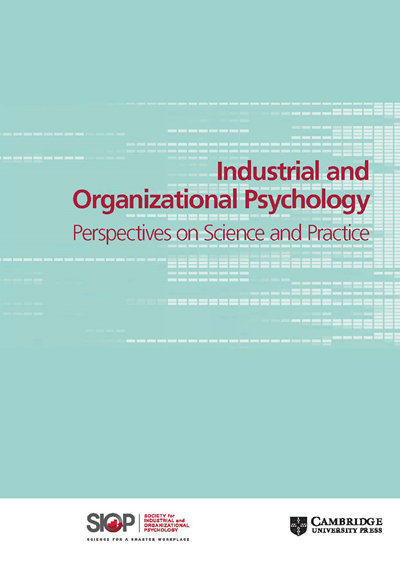Future-proofing I-O psychology: The need for updated graduate curriculum
IF 4.3
3区 心理学
Q1 PSYCHOLOGY, APPLIED
Industrial and Organizational Psychology-Perspectives on Science and Practice
Pub Date : 2023-03-01
DOI:10.1017/iop.2022.110
引用次数: 1
Abstract
Comments on an article by Patrick Hyland (see record 2023-54807-014). Hyland provides a model for reflection and reflexivity to prevent industrial-organizational (I-O) psychology research from growing stale. Authors focus is to expand upon Hyland's model by first reflecting on the recent sociohistorical forces that have shaped I-O psychology and then by proactively future-proofing their field through graduate education focused on transparency, software accessibility, and multidisciplinary collaboration. Recent history has seen an upsurge of unprecedented macro events such as COVID-19, nationwide racial division, political unrest, and mental health crisis;these events make authors aware of blind spots within our societal, scientific, and economical systems. Such events force us as a field to be reactive and adaptive by transitioning from old methods to new and developing methods (e.g., work shifting from in-person to online). However, as humans, authors tend to cling to what is familiar and comfortable, and likewise, their field has often chosen to remain comfortable. Authors believe that the proclivity to resist change results in an overreliance on outdated practices and to combat this, authors suggest a grassroots approach to transformation by focusing on future-proofing graduate coursework. In line with the Society of Industrial Organizational Psychology's (SIOP) strategic goals, authors envision a future that equips future generations of researchers and practitioners with the skills and knowledge to be lifelong learners, so they are prepared for ever-changing challenges. Authors suggest updating the I-O graduate course curriculum by (a) implementing open science practices throughout courses, (b) embracing the latest open-source coding technologies (e.g., R and Python), and (c) advancing inferential inclusivity by teaching Bayesian statistics in addition to traditional methods. This three-pronged approach addresses the need for transparency, software accessibility, and multidisciplinary research to prepare graduate students to theorize, plan appropriate study design, thoughtfully consider necessary analyses, interpret meaningful results, and share those results in a clear and far-reaching manner. Researchers can then prepare for (rather than react to) unprecedented macro events, clarifying our collective identity and future-proofing the field with an updated skill set to overcome obstacles. (PsycInfo Database Record (c) 2023 APA, all rights reserved)面向未来的I-O心理学:需要更新研究生课程
对帕特里克·海兰德的一篇文章的评论(见记录2023-54807-014)。Hyland提供了一个反思和自反的模型,以防止工业组织(I-O)心理学研究变得过时。作者的重点是扩展Hyland的模型,首先反思最近塑造I-O心理学的社会历史力量,然后通过专注于透明度、软件可访问性和多学科合作的研究生教育,积极验证其领域的未来。近年来,新冠肺炎、全国种族分裂、政治动荡和心理健康危机等前所未有的宏观事件层出不穷;这些事件使作者意识到我们社会、科学和经济体系中的盲点。这些事件迫使我们作为一个领域通过从旧方法过渡到新的和正在发展的方法(例如,工作从面对面转移到在线)来做出反应和适应。然而,作为人类,作者往往会坚持熟悉和舒适的东西,同样,他们的领域也经常选择保持舒适。作者认为,抵制变革的倾向导致了对过时做法的过度依赖,为了应对这种情况,作者建议采取一种草根的转型方法,专注于经得起未来考验的研究生课程。根据工业组织心理学学会(SIOP)的战略目标,作者设想了一个未来,让未来几代研究人员和从业者具备终身学习的技能和知识,从而为不断变化的挑战做好准备。作者建议更新I-O研究生课程,方法是:(a)在整个课程中实施开放科学实践,(b)采用最新的开源编码技术(如R和Python),以及(c)通过在传统方法之外教授贝叶斯统计学来提高推理包容性。这种三管齐下的方法解决了透明度、软件可访问性和多学科研究的需求,使研究生能够进行理论化、规划适当的学习设计、深思熟虑地考虑必要的分析、解释有意义的结果,并以清晰而深远的方式分享这些结果。然后,研究人员可以为前所未有的宏观事件做好准备(而不是对其做出反应),澄清我们的集体身份,并用最新的技能来克服障碍,为该领域的未来做好准备。(PsycInfo数据库记录(c)2023 APA,保留所有权利)
本文章由计算机程序翻译,如有差异,请以英文原文为准。
求助全文
约1分钟内获得全文
求助全文
来源期刊

Industrial and Organizational Psychology-Perspectives on Science and Practice
PSYCHOLOGY, APPLIED-
CiteScore
7.70
自引率
10.10%
发文量
85
期刊介绍:
Industrial and Organizational Psychology-Perspectives on Science and Practice is a peer-reviewed academic journal published on behalf of the Society for Industrial and Organizational Psychology. The journal focuses on interactive exchanges on topics of importance to the science and practice of the field. It features articles that present new ideas or different takes on existing ideas, stimulating dialogue about important issues in the field. Additionally, the journal is indexed and abstracted in Clarivate Analytics SSCI, Clarivate Analytics Web of Science, European Reference Index for the Humanities and Social Sciences (ERIH PLUS), ProQuest, PsycINFO, and Scopus.
 求助内容:
求助内容: 应助结果提醒方式:
应助结果提醒方式:


